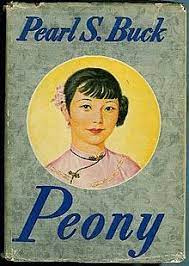I purchased the novel Peony by Pearl Buck at a
book fair this summer. Great book, at a phenomenal price -- $5 for a bag of
books! I put it in my bag without even reading the dust jacket because I’ve
read Buck before (The Good Earth and The Mother)
and knew whatever it was about, it would be set in China, and it would be a good
read.
What I was not expecting was an opening chapter describing
in some detail a Passover Seder. Peony, the
title character, is a bondsmaid for a Jewish family living in K’aifeng in China
circa 1850. Chinese, she was brought
into the household (bought) to be a playmate for the family’s young son, David.
She has been a part of the family since childhood, though as a bondsmaid, she
is not part of the family – a problematic distinction.
Until reading this book, and subsequent research, I was
not aware a small Jewish community existed in China as far back as the
1600s. The underlying story is about how it peacefully co-existed with and eventually assimilates into the larger Chinese population.
Buck tells this story on two levels, one with the character
storyline of the book, the other with a fascinating ongoing discussion of
comparative Confucian philosophy and Jewish theology between David’s father, Ezra ben Israel; and a Chinese merchant who is his father’s closest friend.
In the storyline, David is the key character. He is
infatuated with the daughter of a major Chinese merchant. Yet, his very orthodox mother wants him to marry
the daughter of the Rabbi. And Peony is
secretly in love with David but cannot act on it because of her status as a
bondsmaid.
A reoccurring theme in the novel concerns the personal
debate within each of the Jewish characters concerning eventual return to the
Promised Land vs. staying in China where they have safely lived all their lives.
Significantly (or co-incidentally), Buck had the book published in 1948, the date of the re-establishment of the nation of Israel.
Recommendation:
Excellent.

No comments:
Post a Comment